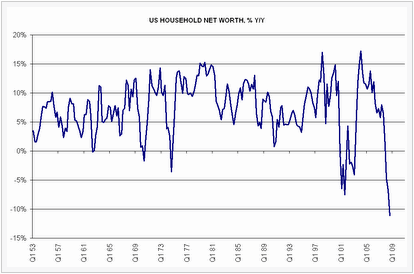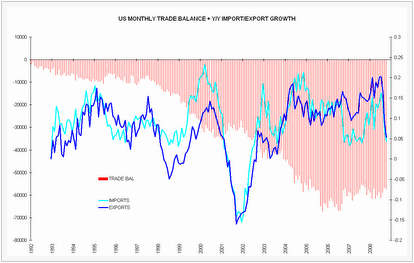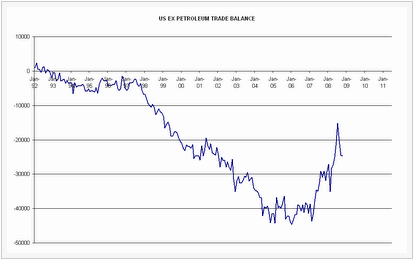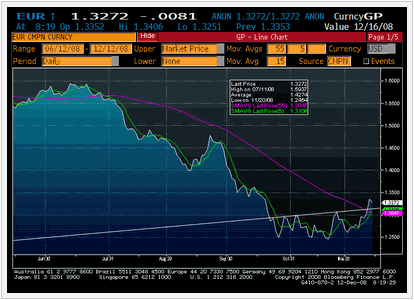It’s said that bad news, like late night buses, comes in bunches. That certainly seems to be the case this week, where a few days of lethargy have been punctuated by a firestorm of fresh Armageddon-fodder over the past twenty-four hours.
Where to begin? Macro Man has to confess that he may have overestimated the market nous of equity punters, given that news of the auto bailout failure served to catalyze a jump lower in stocks. Is it really the case that a Big Three bailout was supporting the market? It boggles the mind, given a) the small size of both the bailout and the market cap of the auto sector, and b) the abject failure of the TARP to buy stocks since its eventual passage in October. Crikey, if $350 billion for the industry at the heart of the economic and financial maelstrom has failed to support Spoos, why did these donuts expect $14 billion to Obsolescence-R-Us to be a rationale for buying stocks?
More sinister is the Bernard Madoff situation, which serves as another poisoned dart striking at the heart of financial system credibility. Now, Macro Man had never heard of Mr. Madoff until a few hours ago, and neither had just about everyone that he speaks to. But the staggering size ($50 billion) and nature (bald-faced fraud) of Madoff’s failure serves as a timely reminder that there are still plenty of rotten apples in the market’s fruit basket. Then again, Madoff’s sin- taking a relatively small amount of investor capital and levering it up via an investment strategy that had no prayer of long-term success- sounds awfully similar to the investment banking business model of the last few years. Perhaps Madoff should convert to a bank holding company and apply for a bit of sweet TARP lovin’?
More prosaically, the economic dataflow remains uniformly awful. Yesterday’s jobless claims data suggests the labour market continues to deteriorate, which probably shouldn’t come as a surprise to anyone with Internet access and a fifth-grade reading level. More troubling, however, were a couple pieces of bigger-picture data that have helped guide Macro Man’s core views.
The US flow of funds data were released yesterday, and they were a shocker. US household wealth is now falling at the sharpest rate in the history of the series (which covers most of the postwar era), superseding the collapse of the dot-com bubble. Unlike 2002, however, there are no further bubbles to inflate to save the consumer’s bacon. The confluence of collapsing wealth and a terrible labour market form the crux of what has been Macro Man’s base-case view for the past couple of quarters- a bone-crushing, consumer-led recession.
A natural outcome of this view has been an expectation that US savings rates would rise (which they are starting to), global trade volumes would decline (which they are), and that the US trade deficit would contract sharply, thereby supporting the dollar. Here’s where we run into a spot of bother.
While it’s not Macro Man’s style to jettison a core view on the basis of one data point, he must confess to being troubled by yesterday’s US trade figures. Rather than narrowing, as he expected, in October, the trade deficit actually widened slightly, despite the collapse in oil prices. Indeed, exports declined more in dollar terms than imports, despite being a much smaller percentage of overall trade. That’s not what Macro Man wanted to see.
Indeed, the deficit excluding petroleum seems to be widening back out thanks to the drop in exports. Could it really be the case that US exporters failed to hedge any futures receivables when EUR/USD was above 1.50? Macro Man isn’t sure what to make of this, but it wasn’t part of the game plan.
Nor, indeed, was a smooth money-market passage into year-end. Instead of squeezing higher, as has been the case over the past few quarter-ends, LIBOR rates are actually coming in hard.
Hmmmm. If the US trade deficit fails to narrow and there is no further funding pressure, two of the major supports for the dollar will have been taken away. Certainly the market is rendering this interpretation, as EUR/USD appears to have broken out of its little trading range of the past couple of months.
Of course, an alternative explanation is that it is December, liquidity is appalling, and some punters have decided to have a go at pushing the dollar lower with little to no opposition. Macro Man requires more data before he can render judgment on whether the dollar bull case has evaporated (though he remains highly dubious of the notion of EUR as a store of value), but he’s seen enough to encourage him to flatten what modest exposures he’s got.
Some of the moves he’s seeing make little sense to him, and he’s happy to run very little FX directional risk until the new year. No news is sometimes good news, as they say…especially when it comes on the stop-loss front.







Leave a Reply